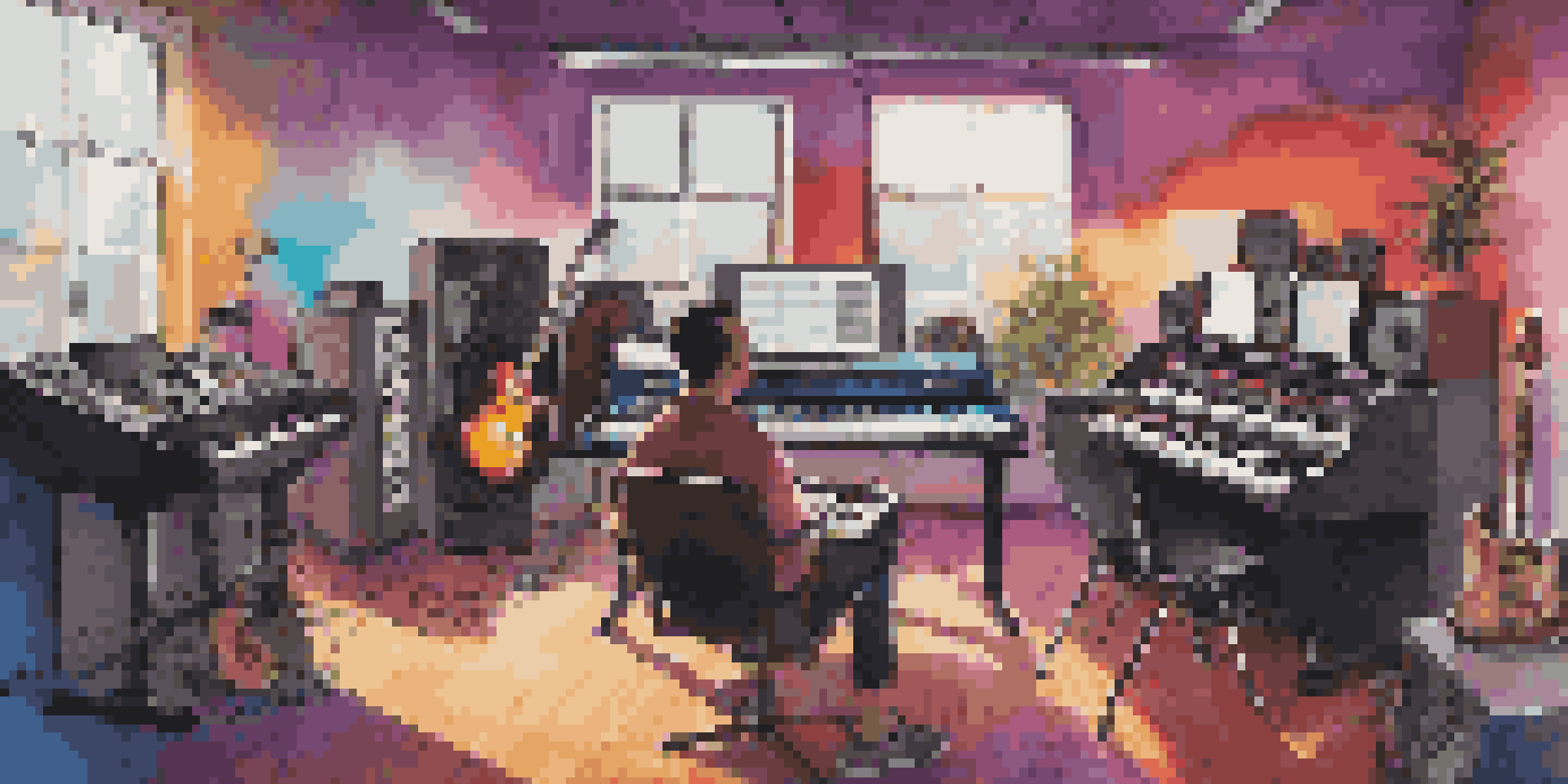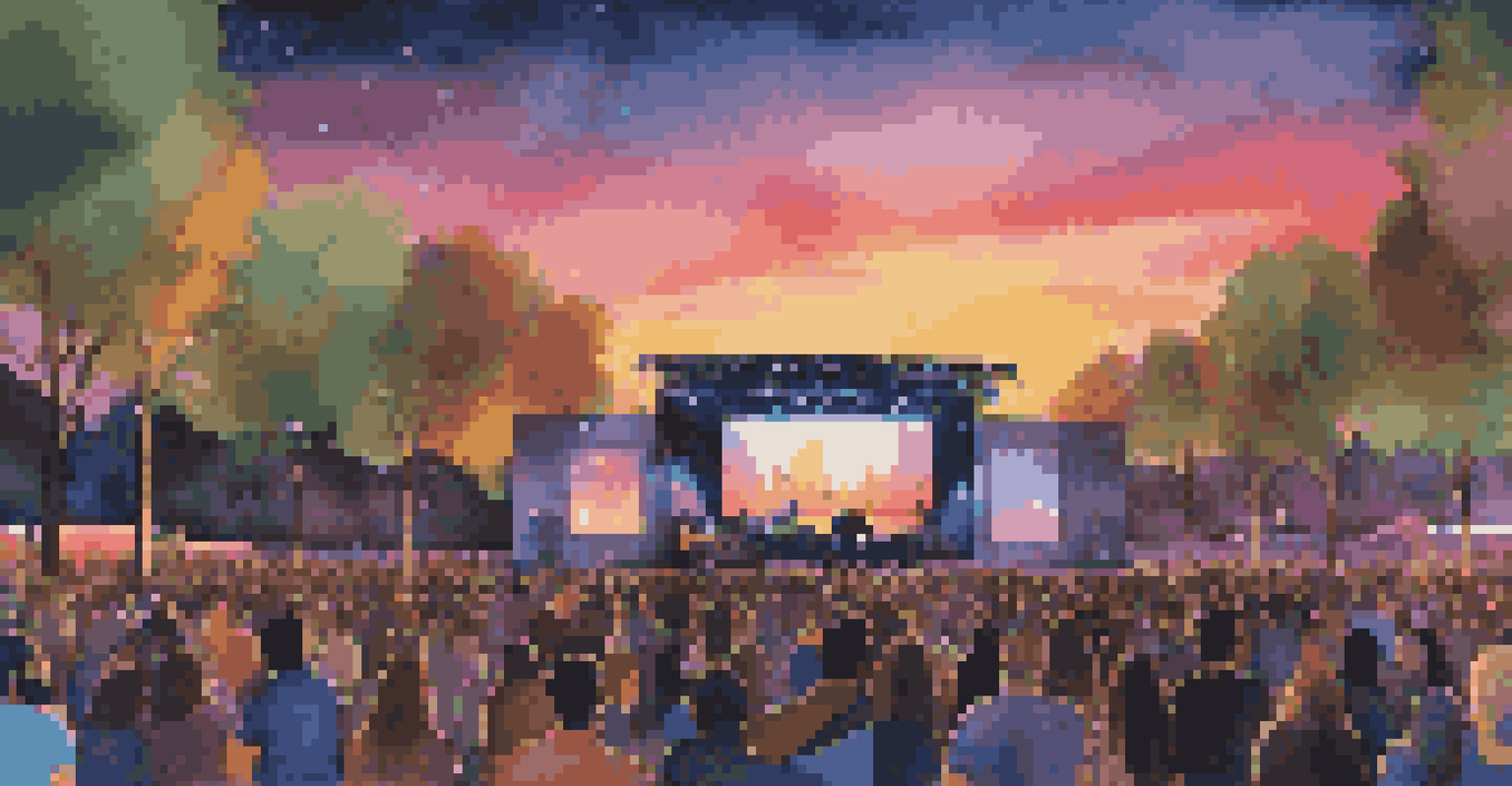How Digital Media Impacts Music Industry Employment Trends

The Rise of Digital Platforms in Music Distribution
Digital platforms like Spotify and Apple Music have revolutionized how music is distributed, allowing artists to reach global audiences without the need for traditional record labels. This shift has created new roles in digital marketing and data analytics, as artists and labels aim to understand listener preferences. Moreover, the ease of access to these platforms has led to a surge in independent musicians, who now have the ability to promote their music directly to fans. As a result, we see a growing demand for skills related to digital content management and online engagement.
Music is the shorthand of emotion.
In addition to distribution, these platforms have introduced various monetization strategies, including streaming royalties and playlist placements. This evolution has led to job opportunities in areas such as playlist curators and streaming strategists, roles that didn't exist a decade ago. Artists must now understand the intricacies of these platforms to maximize their earning potential and visibility. The landscape has changed, and so has the way we view employment in the music industry.
Overall, the digital distribution model has not only broadened access to music but has also fundamentally altered the employment landscape, creating diverse opportunities for creative professionals. As the industry continues to evolve, those who adapt to new technologies will find themselves at the forefront of this transformation.
Impact of Social Media on Artist Promotion and Jobs
Social media platforms like Instagram, TikTok, and Twitter have become essential tools for artists to promote their music and connect with fans. This has given rise to a new job market focused on social media management, where professionals help artists grow their online presence. The ability to create viral content can significantly enhance an artist's visibility, leading to more gigs, collaborations, and ultimately, income. Thus, the role of a social media strategist is now crucial in an artist's career development.

Moreover, social media allows for immediate feedback from fans, providing artists with valuable insights into their audience's preferences. This instant connection has also opened doors for influencers and content creators, who often collaborate with musicians to expand their reach. The cross-pollination of industries emphasizes the need for marketing professionals who understand both music and social media dynamics. As these platforms evolve, so too will the roles associated with them.
In summary, social media has not only changed how artists promote their work but has also created new employment opportunities in the music industry. Those skilled in navigating these platforms will be instrumental in shaping the future of music promotion.
The Shift Towards Remote Work in the Music Industry
The COVID-19 pandemic accelerated the trend of remote work across many industries, including music. Engineers, producers, and songwriters can now collaborate from different locations, using digital tools to create and share music seamlessly. This flexibility has led to a rise in freelance opportunities, allowing professionals to work with multiple artists and projects simultaneously. The traditional recording studio environment has transformed into a more decentralized model that prioritizes versatility and accessibility.
Technology is best when it brings people together.
Remote work has also given rise to online platforms for live performances and music lessons, creating new job opportunities for musicians and educators alike. Virtual concerts and workshops have opened doors to global audiences, allowing artists to monetize their craft in innovative ways. This shift not only impacts how music is created and shared but also expands the geographical scope of employment in the music sector, making it more inclusive and diverse.
As the music industry adapts to this new norm, the demand for skills related to remote collaboration and digital production continues to grow. Professionals who can navigate this landscape will find themselves in a strong position as the industry evolves.
Data Analytics: The New Frontier for Music Professionals
With the rise of streaming services, data analytics has become an integral part of the music industry. Understanding listener behavior through data allows artists and labels to make informed decisions regarding marketing strategies, tour locations, and even song releases. This has created a demand for data analysts who specialize in music metrics, blending the worlds of technology and creativity. The ability to interpret data trends can significantly impact an artist's career trajectory.
Moreover, data-driven insights help in targeting specific demographics, which is crucial for effective advertising and promotion. For instance, knowing which songs resonate the most with listeners can guide playlist placements and promotional campaigns. As a result, professionals skilled in data analysis are becoming increasingly valuable assets in the music industry. Their expertise enables artists to tailor their approach, ensuring better engagement with fans.
In essence, the incorporation of data analytics not only enhances the decision-making process but also contributes to the overall efficiency of marketing efforts in the music realm. As the industry embraces this shift, the focus on data literacy will likely continue to grow.
Emerging Technologies: AI and the Music Creation Process
Artificial intelligence (AI) is reshaping the music creation process, enabling artists to explore new sounds and styles. Tools powered by AI can assist in composing music, generating beats, and even mixing tracks, which opens up a realm of possibilities for creators. This technological advancement has led to the emergence of new roles such as AI music specialists and sound designers, who work alongside musicians to enhance their creative output. The collaboration between human creativity and machine learning is fostering innovation in music production.
Furthermore, AI can analyze music trends and predict future hits, offering invaluable insights to artists and producers. By understanding what elements resonate with audiences, musicians can craft songs that are more likely to succeed commercially. This interplay between technology and artistry emphasizes the need for professionals who are not only musically inclined but also tech-savvy. There’s a growing demand for those who can bridge the gap between creativity and technology.
Ultimately, as AI continues to evolve, it will shape the future of music creation and the types of jobs available in the industry. Musicians and tech professionals who embrace these changes will be well-positioned to thrive in this new landscape.
The Role of Music Supervisors in a Digital Age
In the digital age, music supervisors play a crucial role in connecting artists with opportunities in film, television, and advertising. Their job involves curating soundtracks and selecting songs that align with the visual content, which has become increasingly important as streaming platforms invest heavily in original programming. This shift has resulted in a rising demand for skilled music supervisors who understand both the nuances of storytelling and the music itself. Their expertise can significantly enhance the emotional impact of a scene, making them invaluable in the entertainment industry.
Additionally, the rise of user-generated content on platforms like TikTok has created new avenues for music placement. Music supervisors must now stay ahead of trends and identify emerging artists whose songs could become viral sensations. This requires a keen understanding of social media dynamics and audience engagement. The expanding landscape of music placement offers exciting opportunities for those in the field, as they navigate the intersection of music and visual media.
As the demand for music in various forms of media continues to grow, the role of music supervisors will only become more pronounced. Their ability to blend artistic vision with commercial needs will define the future of music placement in a digital world.
The Future of Live Music and Employment Opportunities
Live music has always been a cornerstone of the industry, and while the pandemic challenged this aspect, it has also sparked innovation. As we move forward, hybrid events—combining in-person and virtual experiences—are likely to become the norm. This evolution will create new job opportunities in event planning, production, and technology, as professionals work to create seamless experiences for audiences both onsite and online. The ability to adapt to changing formats will be essential for those looking to thrive in this environment.
Moreover, the push for sustainability in live events is prompting venues and promoters to seek eco-friendly solutions, further diversifying the job market. Roles focused on sustainable practices, such as green event coordinators, are emerging as the industry seeks to reduce its environmental footprint. This shift not only highlights the importance of innovation but also presents a chance for professionals to contribute positively to the planet while pursuing their passion for music.

In conclusion, the future of live music is bright, with numerous employment opportunities on the horizon. As the industry adapts to new formats and embraces sustainability, those who are flexible and forward-thinking will find themselves in high demand.